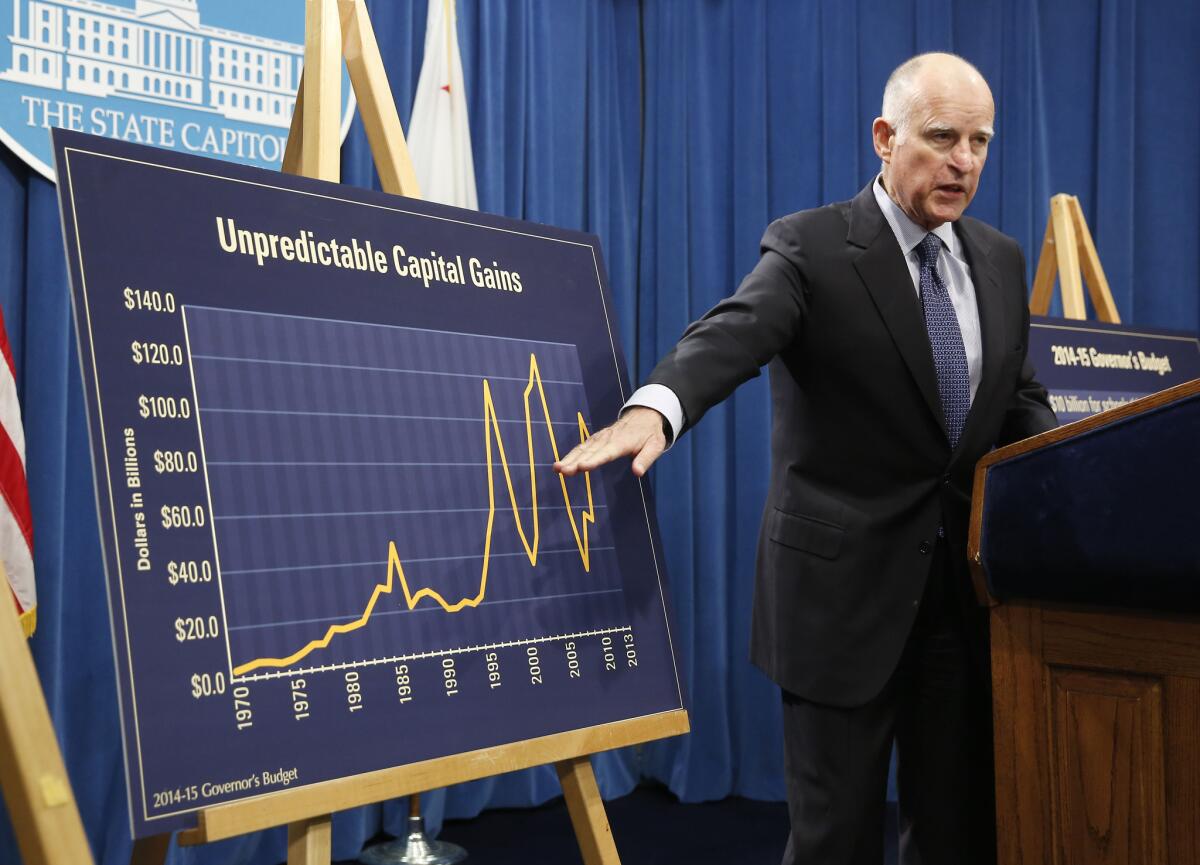Gov. Jerry Brown’s budget tries to tame wild capital gains

Hey Wall Street, California owes you one.
The prolonged bull market has produced two banner years for capital gains in the state, with an even better year expected in 2014. The result has been surging capital gains tax revenues, which account for all of the surplus projected by Gov. Jerry Brown for the coming year.
Those revenues averaged a little less than $4 billion a year from 2008 to 2011, accounting for about 4.5% of the state’s general fund. From 2012 through 2014, the average is expected to be $10.2 billion, or roughly 10% of the general fund.
PHOTO ESSAY: Chris Christie, President Obama and the ‘ignorance is bliss’ dodge
But as Brown points out in the above picture, capital gains follow a roller-coaster trajectory. They shot up during the dot-com boom, then crashed in the aftermath. They rebounded during the housing bubble, only to collapse again when it burst.
One way to eliminate the volatility would be for the state to not tax capital gains. Wait ... can’t breathe ... laughing too hard.... Seriously, voters just approved a ballot measure in 2012 (Proposition 30) that made the state more dependent on capital gains revenue, not less. The idea of lightening a burden that falls disproportionately on higher-income Californians is a nonstarter in the Golden State, regardless of any merit it might have as a policy.
Still, the volatility is a real problem, and the state’s current mechanism for smoothing out the revenue peaks and troughs simply doesn’t work. That would be a ballot measure from 2004 (Proposition 58) that required lawmakers to put 3% of the annual revenues into a Budget Stabilization Fund until the fund’s assets were equal to 5% of the general fund or $8 billion, whichever was larger. But the measure allowed the governor to waive the requirement by declaring a fiscal emergency, which former Gov. Arnold Schwarzenegger and Brown have done repeatedly.
Another problem with Proposition 58 is that it requires the state to kick money into the reserve fund regardless of what’s happening with the state’s economy. A proposed ballot measure set for November (ACA 4) is better on that front, basing the state’s mandatory contribution to the reserve fund on the amount of unanticipated revenue -- that is, the amount that exceeded the 20-year trend line in revenues.
Still, that proposal has at least two real flaws. One is that it doesn’t address the volatility in the amount of school funding guaranteed by Proposition 98, which is just as susceptible to the ups and downs in capital gains as the general fund is. The other is that under ACA 4, mandatory contributions to the reserve fund are triggered by surges in revenue as a whole, not just capital gains taxes. So it could act as a counterweight to sustainable increases in revenue that spring from a healthy economy, not just to the peaks associated with capital gains.
Brown has asked lawmakers to give voters an alternative to ACA 4, one that would direct excess capital gains revenue into the reserve fund and create a separate reserve for school funding. His proposal would also allow the state to use surplus revenue to pay down debts and unfunded liabilities instead of building the reserve, which ACA 4 does not.
The governor left the details of the new ballot measure for the Legislature to work out. At least one top legislative leader -- Assembly Speaker John A. Perez -- has embraced the idea of replacing ACA 4, so it seems likely that lawmakers will take up Brown’s invitation to come up with an alternative.
ALSO:
Liz Cheney’s problem wasn’t her famous name
McManus: Edward Snowden, in shades of gray
Follow Jon Healey on Twitter @jcahealey and Google+
More to Read
A cure for the common opinion
Get thought-provoking perspectives with our weekly newsletter.
You may occasionally receive promotional content from the Los Angeles Times.






